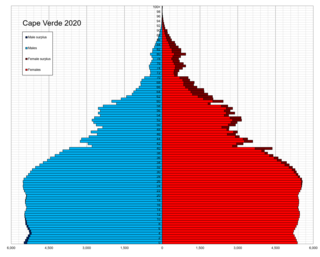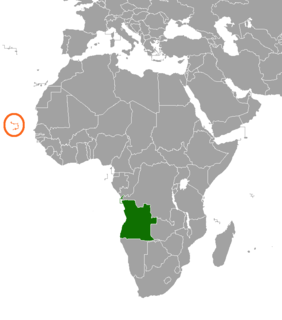Related Research Articles

This article is about the demographic features of the population of Cape Verde, including population density, ethnicity, education level, health of the populace, economic status, religious affiliations and other aspects of the population.

Cape Verde is known internationally for morna, a form of folk music usually sung in the Cape Verdean Creole, accompanied by clarinet, violin, guitar and cavaquinho. Funaná, Coladeira, Batuque and Cabo love are other musical forms.

Portuguese is spoken in a number of African countries and is the official language in six African countries: Angola, Mozambique, Guinea-Bissau, Cape Verde, São Tomé and Príncipe and Equatorial Guinea. There are Portuguese-speaking communities in most countries of Southern Africa, a mixture of Portuguese settlers and Angolans and Mozambicans who left their countries during the civil wars. A rough estimate has it that there are about 14 million people who use Portuguese as their sole mother tongue across Africa, but depending on the criteria applied, the number might be considerably higher, since many Africans speak Portuguese as a second language, in countries like Angola and Mozambique, where Portuguese is an official language, but also in countries like South Africa and Senegal, thanks to migrants coming from Portuguese-speaking countries. Some statistics claim that there are over 41.5 million Portuguese speakers in the continent. Africa is, therefore, the continent with the second-most Portuguese speakers in the world, only behind the Americas. Like French and English, Portuguese has become a post-colonial language in Africa and one of the working languages of the African Union (AU) and the Southern African Development Community (SADC). Portuguese co-exists in Guinea-Bissau, Cape Verde, and São Tomé and Principe with Portuguese-based creoles, but Portuguese continues to be the official language of these countries. Additionally, Portuguese has become the national language of Angola, as it is so widely spoken in every segment of society, and serves as the home language of the majority of the Angolan population, particularly in the big towns and cities. A few native African languages continue to be spoken, but are losing ground to Portuguese. In Mozambique, in addition to Portuguese as the official language, it is fast becoming the lingua franca. And as in Angola, Portuguese is the dominant spoken language in the urban areas of the country. In the five former African Portuguese colonies, Portuguese is the language of: commerce, the government, courts, schools and mass media.
Expresso das Ilhas is a weekly Cape Verdean newspaper that covers its top stories in the archipelago and local stories from each island. The newspaper is located in the Cape Verdean capital city of Praia and has one of the largest circulations in Cape Verde. The newspaper is published in Portuguese, apart from some occasional articles in Cape Verdean Creole. Its current editor-in-chief is João Augusto do Rosário.' Its daily circulation are around 10,000, it costs 100 per copy as of 2010. The newspaper is also available on the Internet.
Cape Verdeans in Canada are Canadian residents whose ancestry originated in Cape Verde.
There are 186,817 people residing in São Tomé and Príncipe according to a 2013 estimate published in the CIA World Factbook. Of these, Cape Verdeans and their descendants make up about 3,000 people. They account for more than half of the 6,000 strong population of the island of Príncipe, which in turn accounts for only about 5% of the total population. Most of the Cape Verdeans in the island nation live in poverty.
Cape Verdean Argentines are Argentine residents whose ancestry originated in Cape Verde. According to the 1980 census, there were about 8,000; but today's population was estimated by some sources to be around 2,000 in 2007. Other sources estimate that in 2006 there were 12,000-15,000 descendants of immigrants from Cape Verde living in Argentina, of whom about 300 are native to the African continent.
Cape Verdeans in France are residents of France who are from Cape Verde or have Cape Verdean ancestry.
There were estimated to be 25,000 Cape Verdeans in Senegal as of 1995.
The presence of Cape Verdeans in Italy dates back to the 1960s.
Cape Verdean Spaniards are residents of Spain whose ancestry originated in Cape Verde.
The Cabo Verdean diaspora refers to both historical and present emigration from Cape Verde. Today, more Cabo Verdeans live abroad than in Cape Verde itself. The country with the largest number of Cape Verdeans living abroad is the United States.

Angola and Cape Verde are members of the African Union, Community of Portuguese Language Countries, Group of 77 and the United Nations.

Cape Verde or Cabo Verde, officially the Republic of Cabo Verde, is an archipelago and island country in the central Atlantic Ocean, consisting of ten volcanic islands with a combined land area of about 4,033 square kilometres (1,557 sq mi). These islands lie between 600 and 850 kilometres west of Cap-Vert, the westernmost point of continental Africa. The Cape Verde islands form part of the Macaronesia ecoregion, along with the Azores, the Canary Islands, Madeira, and the Savage Isles.
Belinda Lima Francis, on album cover simply Belinda, is a Cape Verdean-American singer based in Mindelo.

Cape Verdeans, also called Cabo Verdeans, are a creole ethnic group native to Cape Verde, an island nation in West Africa consisting of an archipelago in the central Atlantic Ocean. Cape Verde is a sociedade mestiça, meaning that the population consists of people with mixed African and European ancestry. The island was uninhabited prior to the arrival of the Portuguese.

Quartel Jaime Mota is a historical building in the historic city centre (Plateau) of Praia, Cape Verde. It is situated at the southern end of Avenida Andrade Corvo, near the Presidential Palace of Cape Verde. It was built between 1823 and 1826 as a military barracks. The present structure in Neo-Manueline style dates from 1872, and was further expanded and modified in the late 19th and early 20th century. After independence, it was named after Jaime Mota, a Cape Verdean militant of PAIGC who was killed in Portuguese Guinea.

Military ranks of Cape Verde are the insignia used to denote rank in the Cape Verdean Armed Forces, including the National Guard and Coast Guard.
Pedro Leitão Brito, commonly known as Bubista, is a former Cape Verdean footballer, currently manager of Cape Verde.

Cape Verdean nationality law is regulated by the Constitution of Cape Verde, as amended; the Nationality Act, and its revisions; and various international agreements to which the country is a signatory. These laws determine who is, or is eligible to be, a national of Cape Verde. The legal means to acquire nationality, formal legal membership in a nation, differ from the domestic relationship of rights and obligations between a national and the nation, known as citizenship. Cape Verdean nationality is typically obtained under the principle of jus sanguinis, i.e. by birth in Cape Verde or abroad to parents with Cape Verdean nationality. It can be granted to persons with an affiliation to the country, or to a permanent resident who has lived in the country for a given period of time through naturalization.
References
- ↑ 1995 Cape Verdean Diaspora Population Estimates Archived 2009-08-29 at the Wayback Machine